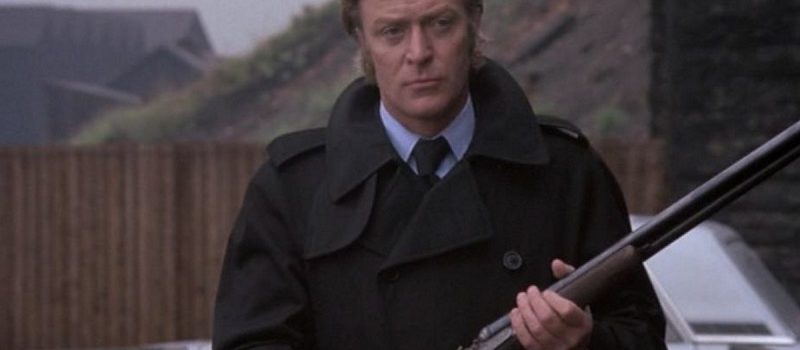Of all the film genres, mob movies have a special place in our collective cinematic heart. What’s not to love? There’s always drama. You can count on some tense, action-filled moments while inhaling a cornucopia of heartstring pullers that leave you catching your breath.
Looking for an organized crime drama that isn’t the normal go-to? You know the ones, who are timeless and triumphant—such as The Godfather, The Godfather 2, Goodfellas and Heat. The Movie Mensch brings you 15 underrated mob movies that will be sure to scratch that mob movie itch.
Who makes the cut? Read on and discover which mob movies get a full-on bear-hugged embrace… and who gets iced.
Donnie Brasco
The feeling that strikes when viewing Donnie Brasco is one of profound tragedy. It’s a mob movie in the best of ways, but there is a deeply personal connection made with Al Pacino’s performance as Lefty. When he hooks up with Johnny Depp’s title character, who also happens to be undercover FBI, audiences are in for some tense drama over the course of Mike Newell’s fantastic film. Lefty continually tries hard to please his boss and never seems to be able to work himself into the upper echelons of the organization. When Donnie saunters into his life, Lefty believes that his addition to their crew will elevate his stature and success will finally embody his existence.
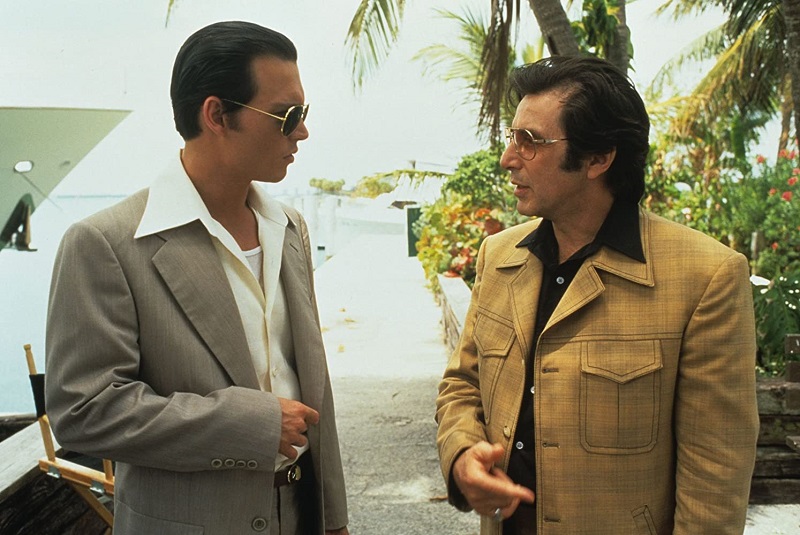
Depp plays both sides of this character with aplomb. On one hand, he’s an undercover detective portraying an aspiring gangster working to bring down an organization at the expense of Lefty. On the other hand, he’s a husband to Maggie (Anne Heche). Whenever he is home, which isn’t much, it’s difficult to shake the life that he has merely put on pause before he heads back into the lion’s den. It’s a potent dichotomy. As Newell frames the film, it intensely moving.
Married to the Mob
Jonathan Demme’s Married to the Mob is a 1998 gangster comedy that follows the exploits of one extraordinary woman, Angela DiMarco (Michelle Pfeiffer). She was married to mobster Frank de Marco (Alec Baldwin), so life got interesting when he was snuffed by his higher-ups. One of those mobsters is Tony ‘The Tiger’ Russo (the always awesome Dean Stockwell). He’s got a bit of a crush on Angie. But he’s married to the obsessively jealous Connie Russo (Mercedes Ruehl). Even though Angie is in mourning, Connie makes life incredibly difficult for our title character. One would think that Angie could get away from the family once her husband was offed, but you’d be comically wrong.
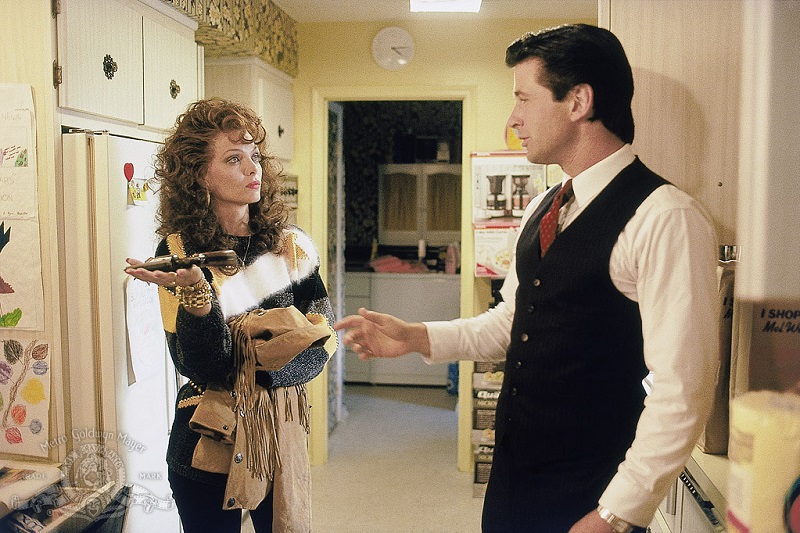
Meanwhile, Matthew Modine’s federal agent, Mike Downey, is hot on the trail of the organized crime syndicate and in the process befriends Angie. He may (or may not) have developed feelings for her. She kind of likes him as well. What’s a girl to do? The other mob wives aren’t impressed with her, especially Connie and Joan Cusack’s Rose. The acting, top to bottom, is stellar. How Married to the Mob utilizes the tried and true genre of mob movies is wildly original. It possesses the same punch that a gangster flick must, but does so with such an avalanche of humor and heart. That is largely thanks to the sharp script penned by Barry Strugatz and Mark R. Burns.
Colors
Colors features Sean Penn and Robert Duvall as partners in the gang unit of the Los Angeles Police Department. It’s the late 80s and gangster activity in the City Angels is at a fever pitch. Penn is the newbie to this department and Duvall is showing him the ropes. Problem is, they have clashing views of how to handle the crime that is littering the streets and piercing the lives of innocents.
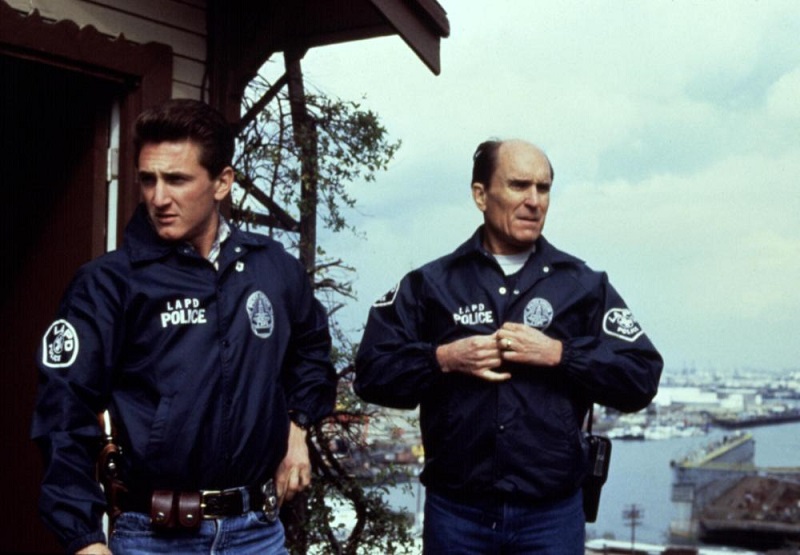
Dennis Hopper directs this timely, and sadly timeless, barebones look at a war that was going on between the police of Los Angeles and its gang communities. Innocents die and are maimed in the crossfire, as both gang bangers and cops pay the ultimate price. It doesn’t end pretty. Then again, there is nothing about the life of gangs on America’s streets that end with peace and happiness. Hopper, drawing from Michael Schiffer’s stellar script, portrays well-meaning police officers and an Angelino citizenry who turn to crime because when it comes to other opportunities—there are none. The cast is outstanding, led by Penn and Duvall, and supported by Maria Conchita Alonso, Don Cheadle, and Damon Wayans. Oh, and the soundtrack, led by Ice-T’s title track, hits you right in the heart and head.
Seven Psychopaths
The guy who brought us In Bruges came back and delivered one hilarious and thrilling knockout punch that is Seven Psychopaths. Woody Harrelson is psycho number one. He had his Shih Tzu stolen by a couple of psychos—Christopher Walken and Sam Rockwell. The dognappers chose the wrong person to steal a canine from—Harrelson. He is an angry gangster, and he LOVES his dog. Joining Walken and Rockwell in this stellar cast is Colin Farrell, Tom Waits, Harry Dean Stanton, Abbie Cornish, and Gabourey Sidibe.
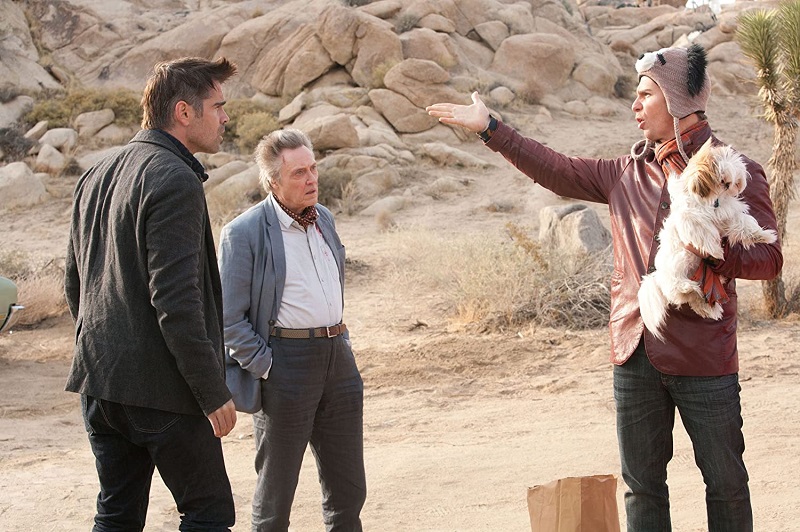
What sets Seven Psychopaths apart is it is a gangster movie, through and through, but it injects the wittiest and darkest of humor throughout the tension-filled drama. Writer-director Martin McDonagh has a way with words. That gift permeates his entire script. He also is firmly an “actor’s director,” as he let his electric ensemble fly high by giving them pitch-perfect direction and innate dialogue that feels as raw as it does real. Love. This. Movie!
Carlito’s Way
You’ve just gotten out of prison and already your old cohorts are recruiting you to get back in the game. Not now, says Al Pacino’s titular character. But as he said in Godfather 3 (not on this list!), “they pull me back in.” That is certainly what occurs in Carlito’s Way. As transcendent as Pacino was playing a Cuban gangster in Scarface, he nails the Puerto Rican accent and everything about the rich island people in Carlito’s Way. If this movie were made now, I have no doubt they would have cast a Latinx actor in the role. That being said, Pacino did hit it out of the park. So too did Sean Penn as you’ve never seen him before, sporting a fantastic “Jewish Fro!”
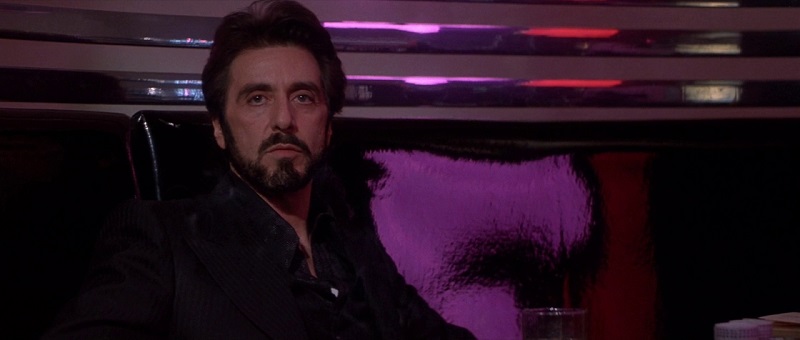
We have empathy for Carlito. Audiences are pulling for him to do the right thing. But this is a Brian DePalma movie and rarely do his protagonists follow the tried and true. To think, he almost had it all… life without crime and the love of his life in the form of stripper Penelope Ann Miller. The energy of this flick, stems firmly from the Edwin Torres novels, is electrically brought to the screen by writer David Koepp (who recently wrote and directed the Kevin Bacon thriller You Should Have Left). Given that there are so many Torres novels, here’s hoping in this age of lack of originality in Hollywood, someone taps that resource for more Carlito movies.
City of God
Brazil provided us with one of the best gangster movies of all-time. If you haven’t seen 2002’s City of God, aka Cidade de Deus, race to watch it right now. I’ll wait.
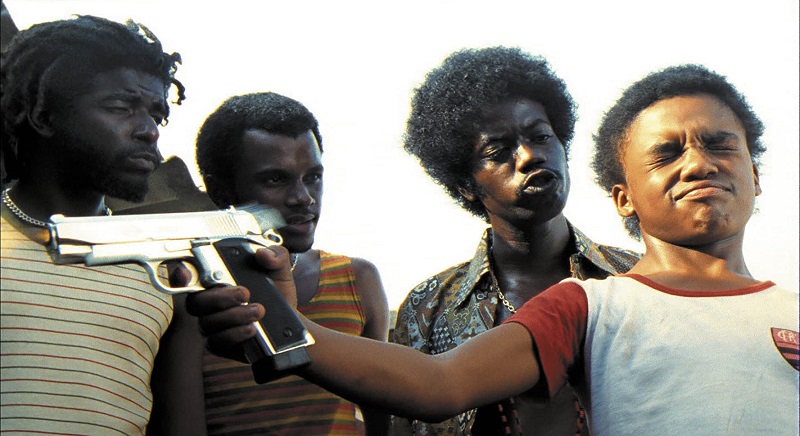
It’s a beautifully tragic story about the slums of Rio. Our two leads are kids when their journey connects. One would grow up to be a sensational photographer and other, a nefarious drug kingpin. Throughout it all, the two are tethered and it is that connection that paints the glorious artwork that is the sun-soaked glory of City of God. The slums of Rio, where our protagonist and antagonist meet and grew up, are portrayed by directors Fernando Meirelles and Kátia Lund, as a rough landscape that few escape.
The Oscar nominee (for Best Foreign Language film) is extremely powerful and speaks to the question of fate, fateful choices and above all else, the strong connection we all share to our youth. No matter hard we try to run away from our past, it will always be right there, like an anchor.
Road to Perdition
Sam Mendes is a master storyteller, one who has crafted genius pieces of cinema such as American Beauty, Skyfall, and of course last year’s 1917. What he achieved with his venture into the mob movie milieu was breathtaking on so many levels. Road to Perdition stars Tom Hanks as a mob hit-man, Michael Sullivan, in the 1930s, working for Paul Newman’s crime boss, John Rooney.
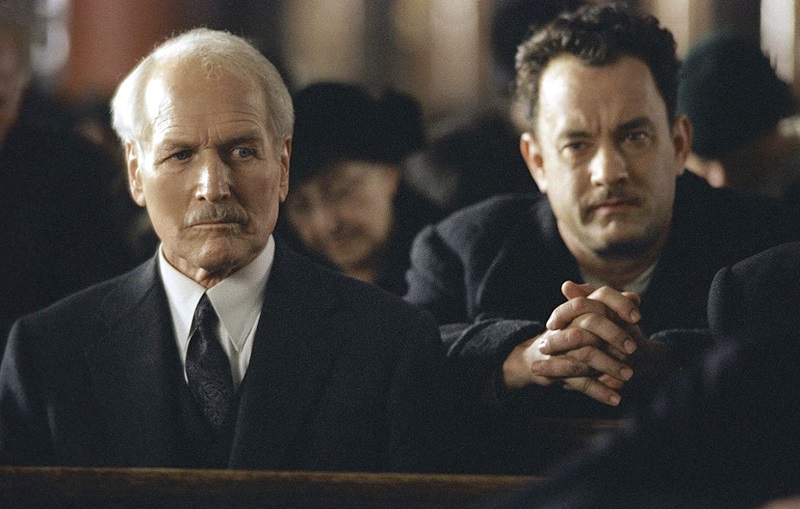
Things get serious for Hanks’ Sullivan when his son witnesses a murder. The duo must hit the road as he rejects all connections to his previous employer and his family becomes enemy number one for the mob. Based on a graphic novel, Mendes has a pitch-perfect touch and delivered a mob drama filled to the brim with emotion and familial power. There are a few scenes between Newman and Hanks that are some of the most subtly fiery moments of the film. Then, there’s the addition of Daniel Craig (soon to be seen in No Time to Die) and Jude Law (as you’ve never seen him before), which adds even more power to this riveting gangster period piece. In the end, the story of a father willing to go to the ends of the earth to protect his son is what beats this film’s heart.
King of New York
Back in 1990, Christopher Walken, Wesley Snipes, Victor Argo, Steve Buscemi, Giancarlo Esposito, and Laurence Fishburne got together for director Abel Ferrera and the result was an organized crime drama that didn’t feel like any other. King of New York was unique in how it wove its tapestry of players. Walken plays a drug kingpin, who upon his release from Sing Sing, he seeks to put his footprint on the crime landscape of Manhattan.
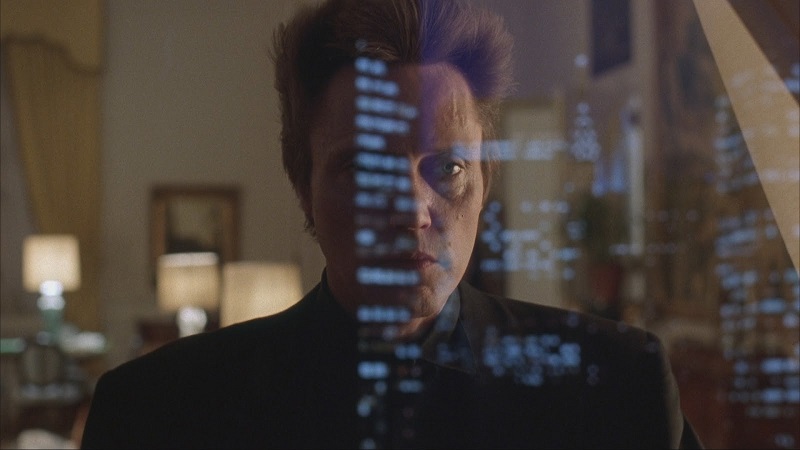
This is Walken at his finest. His command of the screen is immeasurable in this role. It becomes perfectly clear why the cronies in his crew would say, “how high,” when he says, “jump.” He is charismatic, almost enigmatic. Meeting him in that upper echelon of performance is the entire ensemble in Abel’s crime epic. This things pops from the get-go and doesn’t waste dramatic space or exposition unless it firmly connects the dots to the overall plot. The King of New York is complicated and doesn’t hold your hand. There are layers upon layers of the intricate plotline in this picture that is not for those viewers who need a road map for their stories.
Walken’s Frank White has high aspirations, including becoming Mayor. It is his panache that is most appealing. As the actor captures his essence, it is a fierce and simultaneously joyful take on a gangster, something rarely so brilliantly achieved in the cinematic arts.
A History of Violence
Viggo Mortenson would star in the 2007 drama Eastern Promises with filmmaker David Cronenberg. Two years earlier, his connection with the esteemed filmmaker started with A History of Violence. That flick makes this list due to its everyman-centric story that gradually evolves into a five-alarm fire of searing heat.
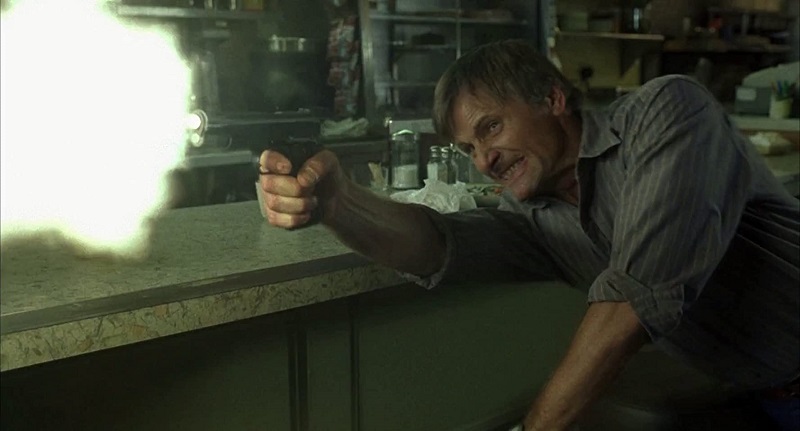
The film’s moniker serves as a descriptor of Mortenson’s character and his past. Tom Stall is living a blissful life in suburbia when we first meet him, right alongside his lovely wife Edie Stall (Maria Bello) and kids. Then, an act of heroism completely upends their life. Tom rightfully stepped in to help someone in need. Sadly, it also served as the crux of what would bring the past into the present as it greatly disrupts—or even destroys—his future.
A History of Violence also stars Oscar nominee Ed Harris and Oscar winner William Hurt.
Ghost Dog: The Way of the Samurai
Just the premise alone had us from the get-go. Forest Whitaker stars as a mob hitman whose specialty is utilizing the fighting methods of the samurai—including one wickedly awesome sword. This mob movie arrives from writer-director Jim Jarmusch (The Dead Don’t Die) and firmly has his talented handprints all over this underappreciated flick. Whitaker has a blast. That old adage is true—if the performers are having fun, so too will the audience.
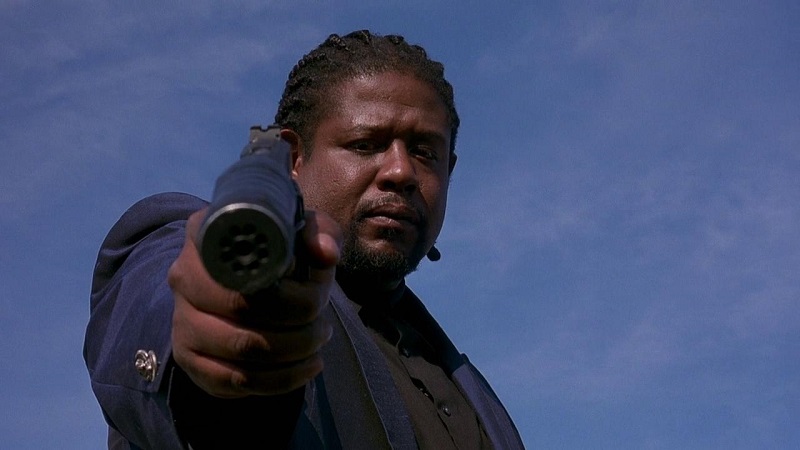
When things suddenly change—instead of being the hitman, he becomes the mark, Ghost Dog: The Way of the Samurai takes off and doesn’t stop until its explosive conclusion. It’s the richest of journeys as Jarmusch has embedded a personal history in Whitaker’s Ghost Dog that didn’t take a whole ton of exposition. That allows the filmmaker to hone the action scenes which push the envelope. Jarmusch and Whitaker have an actor-director chemistry that is off the charts. When thespian and movie maker arrive each day on the set with the enthusiasm that comes through every millisecond of Ghost Dog, the audience wins. As Dick Clark used to say on American Bandstand, “the hits just keep on coming.” In this case, that means fight choreography that is as much a marvel for the eyes as the action works its wonder on your ever-escalating beating heart.
Get Carter
No, this is not the Get Carter that was the 2000 remake starring Sly Stallone. This is the real deal that arrived in 1971 and found legend Michael Caine portraying a London gangster who loses his brother under what appear to be nefarious circumstances. He leaves his metropolis home and heads to Newcastle in search of answers. Pity the fools who get in his way.
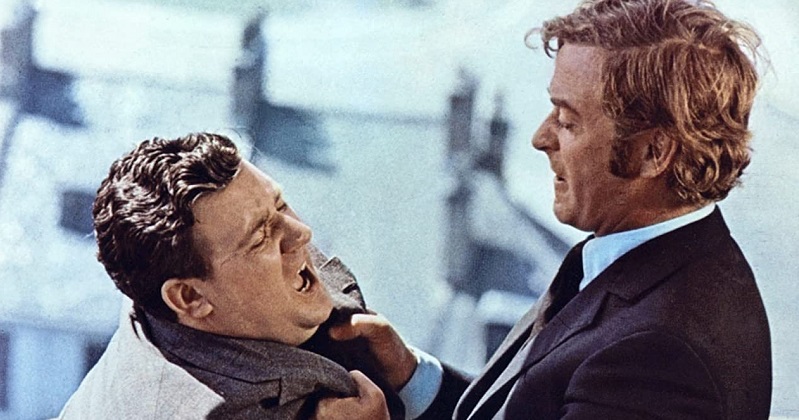
Get Carter finds the master, Caine, in the prime of his power. Witnessing him methodically dress down anyone who has any kind of clue about what happened to his brother is the purest form of cinematic bliss. It is an actor meeting a moment head-on. In the process, Caine enlivens the film and makes it an instant classic. The actor’s character, Jack Carter, finds more than he bargained for when he lands in Newcastle to arrange and hold his sibling’s funeral. Lucky us, because how it all plays out is equally as unpredictable as it is thrilling and wildly entertaining. What commences as sorrow and loss, evolves into riveting retribution.
New Jack City
Ice-T as a cop?! Well, now that seems hardly surprising—what with his successful turn in Law & Order: SVU for the last two decades. But back when New Jack City debuted in theaters 1991, it was rather shocking to see the guy who would rap about being a Cop Killer. Ice is merely one spoke in the wheel of Mario Van Peebles’ awesome directorial debut.
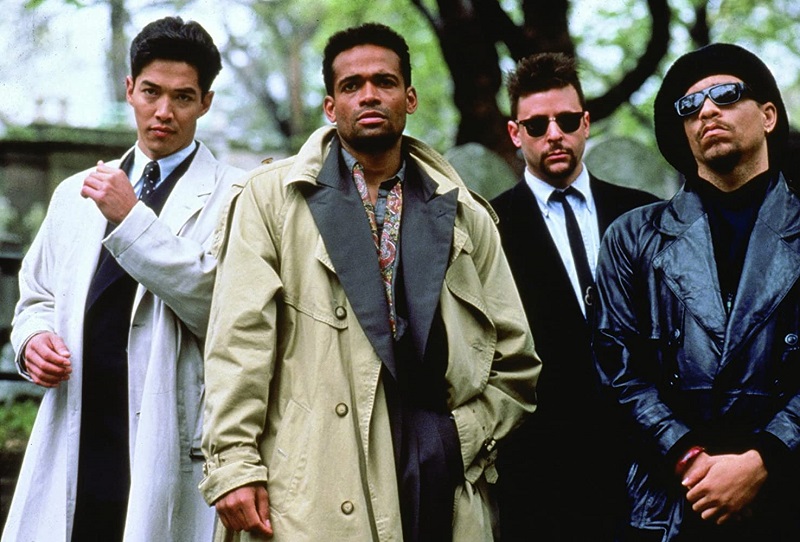
Wesley Snipes stars as an aspiring drug kingpin, Nino Brown, who comes into power just as a little drug called crack makes its debut on America’s streets. Cocaine is expensive. What crack did was break it down, infuse it with a slew of chemicals, and sell it at an “affordable” price. It would overtake inner cities and particularly public housing and leave nothing but death and destruction in its wake.
Ice’s cop goes undercover and manages to infiltrate Snipes’ inner circle. The hope is that he will be key in bringing down the gangster’s world. What he sees and experiences is horrifying. That shock, well… he channels positively. Director Peebles paints the most exhilarating of pictures. Much of that credit has to land at the feet of Ice-T. Witnessing him keep those fierce emotions in check is intense. Ice is not alone in the awe-inspiring performance, what with Judd Nelson portraying his partner, Nick Peretti, in a role that I am honestly surprised didn’t lead to more movie role offers.
Many of us know the titular theme song (New Jack Hustler), written and performed by Ice-T. So much of what makes the film so compelling can be found in the lyrics of that hit. The rapper does an extraordinary job of capturing the tone and messages of the gangster-centric flick.
“I got nothin to lose, much to gain
In my brain, I got a capitalist migraine
The ends justifies the means, that’s the system
I learned that in school then I dropped out
Hit the streets, checked a grip, and now I got clout
I had nothing, and I wanted it
You had everything, and you flaunted it
Turned the needy into the greedy
With cocaine, my success came speedy.”
Once Upon a Time in America
The Godfather films are mob movie epics. For that, there is no question. Although those flicks are adored, there is another with an equally impressive scope that doesn’t get mentioned in the pantheon of the “great mob movies.” Famed Italian filmmaker Sergio Leone’s Once Upon a Time in America took his camera that had traditionally stayed in the western milieu, and he took on an enormous scope that is the mob in America, specifically NYC.
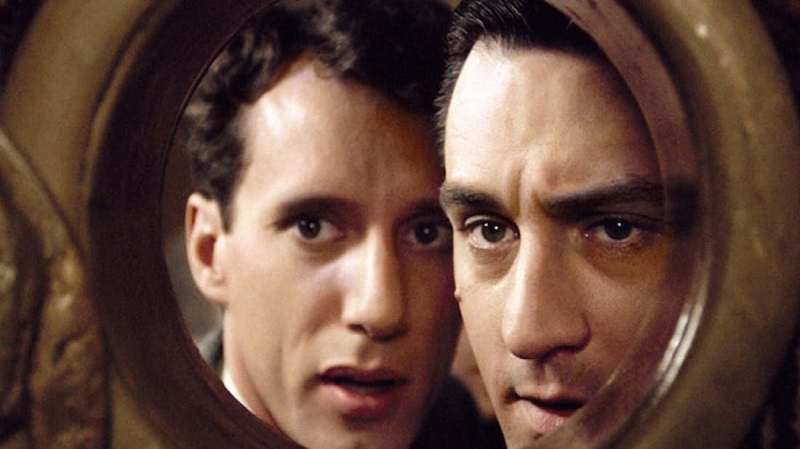
The man who gave us The Good the Bad and the Ugly and A Fistful of Dollars triumphed with his effort to bring Harry Grey’s seminal novel to the big screen. The 1984 film has long since left the theaters, but if there is ever a screening of Leone’s masterpiece on the silver screen—run, don’t walk, and witness this movie marvel.
Once Upon a Time in America follows, meticulously, the exploits of a Jewish gangster from the Lower East Side of Manhattan. The crime boss, known only as Noodles (Robert De Niro), returns to his neighborhood three decades later and is innately compelled to revisit his past, make peace with his sins and look the ghosts of his youth in the eye. De Niro is joined by James Woods, Elizabeth McGovern, Treat Williams, Burt Young (Rocky), Joe Pesci, Danny Aiello, and William Forsythe in an utterly electric ensemble. The cinematography, the score, the performances, and of course, the direction, are all tip-top. Even though the film clocks in at three hours and 49 minutes, it is such an incredibly crafted film with a deep and riveting storyline that as soon as those credits roll, one would be tempted to simply press play again!
Layer Cake
Long before Daniel Craig’s name became synonymous with James Bond, he portrayed a killer of a different sort in Layer Cake. Matthew Vaughn (who would grow up and start his own franchise—The Kingsman, as well as helming X-Men: First Class and Kick-Ass—helmed a mob movie that has Craig portraying a gangster simply known as XXXX.
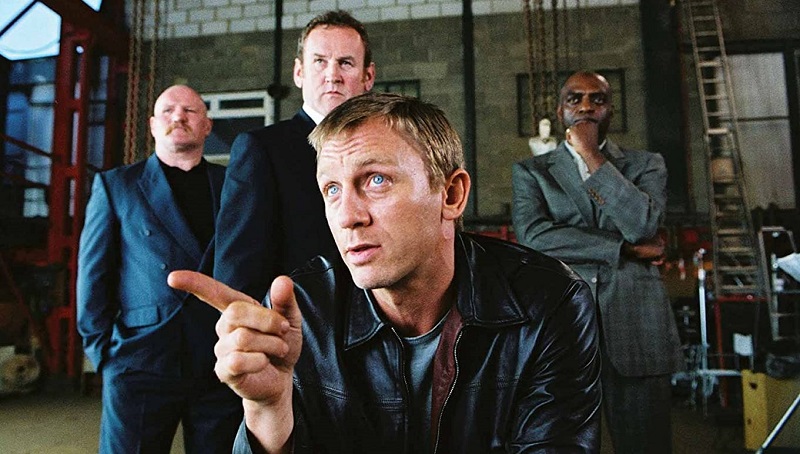
He is a successful cocaine dealer and is about to call it a day. He’s pushed his luck as far as he is comfortable and is ready to retire. Now, as anyone can attest who has seen any stories about kingpins, there usually isn’t a retirement plan that is acceptable to all parties involved in said business. XXXX gets not one, but two, challenging jobs just as he’s about to walk away. If you’re thinking Layer Cake is one of those films where the protagonist (or antagonist) says, “one last gig,” and we all know how that works out. It’s not.
The first of these tasks is to track down an associate’s daughter, Charlie (Nathalie Lunghi). She’s a drug addict and getting her to agree to come home after she ran away may be the tougher of the two tasks. The second, involves XXXX facilitating the acquisition of one million doses of ecstasy from a gangster who goes by the moniker of “The Duke” (Jamie Foreman). Thing is… those pills were stolen from a group of Serbian war criminals. They might not be OK with that.
The 2004 mob movie also starred Sally Hawkins (The Shape of Water), Colm Meaney (Con Air, Tolkien), Ben Whishaw (who would reteam with Craig in the Bond movies as “Q”) and Sienna Miller (who recently dazzled in American Woman).
Layer Cake features Craig being downright explosive in the center of this storm and that is some fantastical film fun.
The Gentlemen
It baffles me to this day why The Gentlemen didn’t strike more of a chord with audiences. It was a return to Snatch form for Guy Ritchie. The UK gangster tome features Matthew McConaughey as an American ex-pat and weed dealing kingpin. His Michael Pearson is the green leaf leader of London. Although he hawks a product that mellows the soul, the Oscar winner’s tenacity should never be questioned. Lucky for us, but unlucky for anyone who tries to steal or even exploit his business.
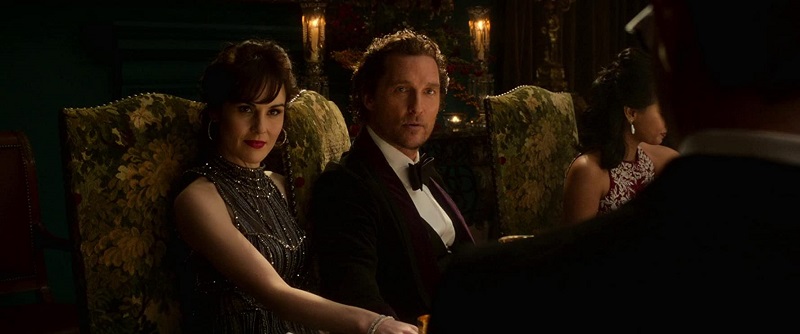
Michelle Dockery scorches as Michael’s wife, Rosalind Pearson. She is every bit a part of this endeavor, the family business. One gets the sense that she would, without hesitation, use her high-heel as a weapon on the poor sap who dares to challenge her or her hubby. Charlie Hunnam (Ritchie’s lead in King Arthur and blew us away in the stellar 2016 flick, The Lost City of Z. In The Gentlemen, the Newcastle born (speaking of Newcastle!) actor is Michael’s right-hand man. When he’s approached by Fletcher (Hugh Grant, in an Oscar-worthy turn) to sell the weed business to him, it is in a manner that hardly feels like a request.
Thankfully, Michael has quite the staff helping him remain on top. Colin Ferrell delivers the performance of his career as Coach, complete with a certain British Isle accent that pierces the soul. Jeremy Strong (Succession, Selma) subtly sears, while Crazy Rich Asians breakout Henry Strong goes off—in the best of ways—as a mob enforcer.
Ritchie has grown as a filmmaker and appears to have learned the lessons of his somewhat land-mined past. Sure, he just had the smash hit Aladdin illustrate his gifts are not limited to telling the stories of criminals. The moviemaker’s Sherlock Holmes and its sequel were also well received. There is always the misses and the press is quick to point those out, we won’t. Not here. This is a celebration of the embodiment of mob movie escapism. Ritchie has created a film that mirrors Snatch’s tone, yet in a manner that is exponentially more cinematic.

